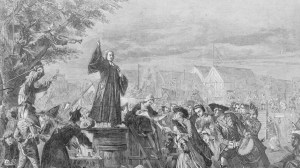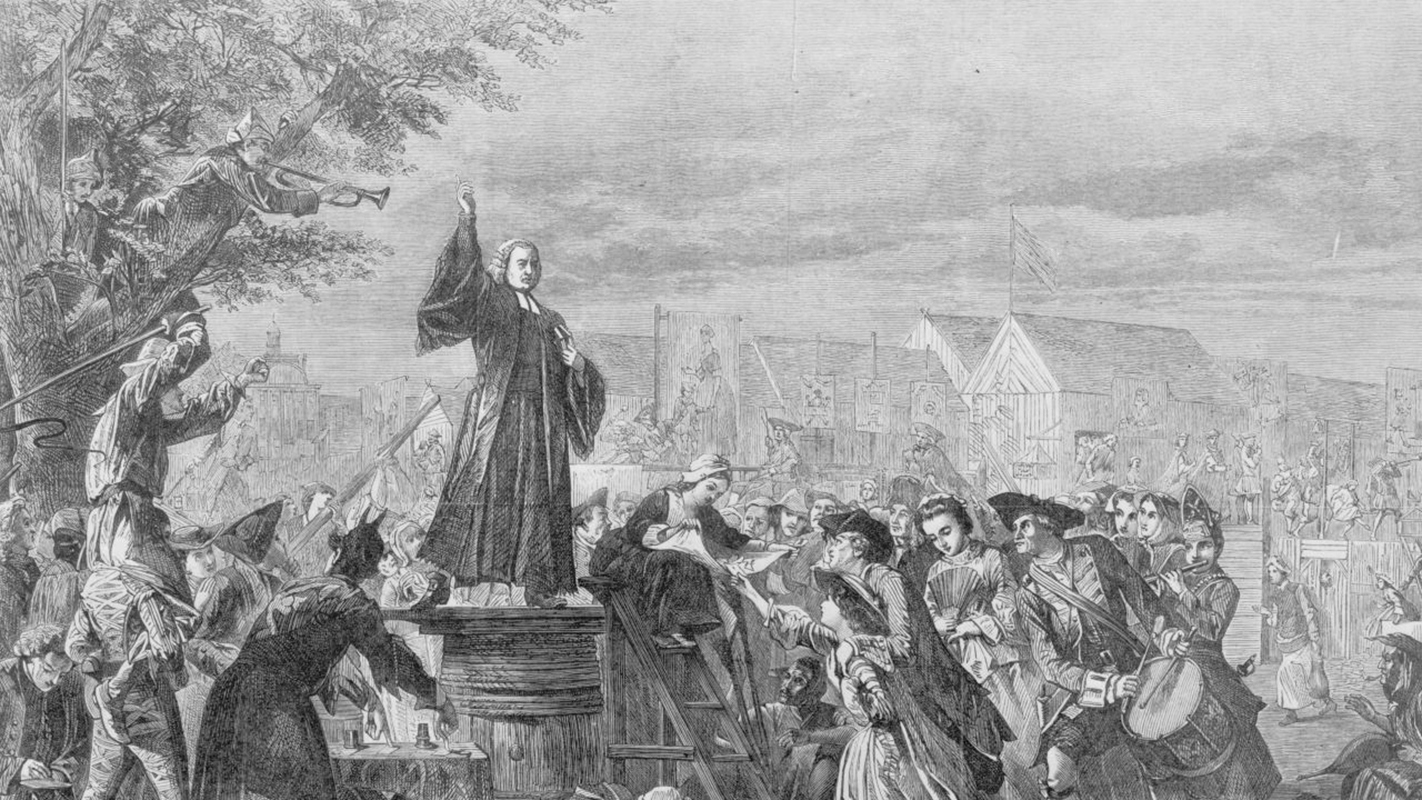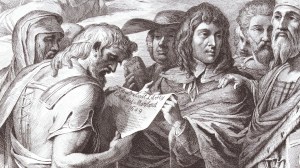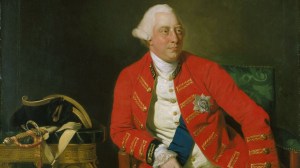In this series

It’s 1775. The year 1787, with its novel constitution and separation of church and state is a long 12 years away. At the moment, you and your friends are just a bunch of outlaws.
You’ve heard the debates in Parliament over taxation and representation; you’ve seen British troops enforce royal supremacy at the point of a bayonet. Your king, George III, and Parliament have issued a declaration asserting their sovereignty in “all cases whatsoever” in the colonies. You are, at least in New England, a people under siege with British troops quartered in Boston. You’ve dumped tea into Boston’s harbor in a fit of rage and had your port closed.
Who will you turn to now for direction? There are no presidents or vice-presidents, no supreme court justices or public defenders to call on. There are a handful of young, radical lawyers, like the Adams cousins, John and Samuel, but they’re largely concentrated in cities, while you and most of your friends live in the country. In many colonies, including Massachusetts, there are not even elected governors or councilors—they have all been appointed by the British crown and are answerable to it.
Where you turn is where you have habitually turned for over a century: to the prophets of your society, your ministers.
The American Revolutionary era is known as the “Golden Age of Oratory.” What school child has not heard or read Patrick Henry’s immortal words, “Give me liberty or give me death”? Who has not seen reenactments or heard summaries of Ben Franklin’s heroic appearance before a hostile British Parliament?
Yet often lost in this celebration of patriotic oratory is the key role preaching played in the Revolutionary movement.
TV, Internet, and More
A few broad statistics can help us appreciate more fully the unique power the sermon wielded in Revolutionary America.
Over the span of the colonial era, American ministers delivered approximately 8 million sermons, each lasting one to one-and-a-half hours. The average 70-year-old colonial churchgoer would have listened to some 7,000 sermons in his or her lifetime, totaling nearly 10,000 hours of concentrated listening. This is the number of classroom hours it would take to receive ten separate undergraduate degrees in a modern university, without ever repeating the same course!
The pulpits were Congregational and Baptist in New England; Presbyterian, Lutheran, and German Reformed in Pennsylvania and New Jersey; and Anglican and Methodist in the South. But no matter the denomination, colonial congregations heard sermons more than any other form of oratory. The colonial sermon was prophet, newspaper, video, Internet, community college, and social therapist all wrapped in one. Such was the range of its influence on all aspects of life that even contemporary television and personal computers pale in comparison.
Eighteenth-century America was a deeply religious culture that lived self-consciously “under the cope of heaven.” In Sunday worship, and weekday (or “occasional”) sermons, ministers drew the populace into a rhetorical world that was more compelling and immediate than the physical settlements surrounding them. Sermons taught not only the way to personal salvation in Christ but also the way to temporal and national prosperity for God’s chosen people.
Events were perceived not from the mundane, human vantage point but from God’s. The vast majority of colonists were Reformed or Calvinist, to whom things were not as they might appear at ground level: all events, no matter how mundane or seemingly random, were parts of a larger pattern of meaning, part of God’s providential design. The outlines of this pattern were contained in Scripture and interpreted by discerning pastors. Colonial congregations saw themselves as the “New Israel,” endowed with a sacred mission that destined them as lead actors in the last triumphant chapter in redemption history.
Thus colonial audiences learned to perceive themselves not as a ragtag settlement of religious exiles and eccentrics but as God’s special people, planted in the American wilderness to bring light to the Old World left behind. Europeans might ignore or revile them as “fanatics,” but through the sermon, they knew better. Better to absorb the barbs of English ridicule than to forget their glorious commission.
For over a century, colonial congregations had turned to England for protection and culture. Despite religious differences separating many colonists from the Church of England, they shared a common identity as Englishmen, an identity that stood firm against all foes. But almost overnight, these loyalties were challenged by a series of British imperial laws. Beginning with the Stamp Act of 1765 and running through the “Boston Massacre” of 1770, the Tea Act of 1773, and finally, martial law in Massachusetts, patriotic Americans perceived a British plot to deprive them of their fundamental English rights and their God-ordained liberties.
In the twentieth-century, taxation and representation are political and constitutional issues, having nothing to do with religion. But to eighteenth-century ears, attuned to lifetimes of preaching, the issues were inevitably religious as well, so colonists naturally turned to their ministers to learn God’s will about these troubling matters.
Tyranny Is “Idolatry”
When understood in its own times, the American Revolution was first and foremost a religious event. This is especially true in New England, where the first blood was shed.
By 1775 the ranks of Harvard- and Yale-educated clergymen swelled to over 600 ministers, distributed throughout every town and village in New England. Clergymen surveyed the events swirling around them; by 1775 liberals and evangelicals, Congregationalists and Presbyterians, men and women—all saw in British actions grounds for armed resistance.
In fact, not only was it right for colonists to resist British “tyranny,” it would actually be sinful not to pick up guns.
How did they come to this conclusion? They fastened on two arguments.
First, they focused on Parliament’s 1766 Declaratory Act, which stated that Parliament had sovereignty over the colonies “in all cases whatsoever.” For clergymen this phrase took on the air of blasphemy. These were fighting words not only because they violated principles of representative government but even more because they violated the logic of sola Scriptura (“Scripture alone”) and God’s exclusive claim to sovereignty “in all cases whatsoever.”
From the first colonial settlements, Americans—especially New England Americans—were accustomed to constraining all power and granting absolute authority to no mere human being.
For Reformed colonists, these ideas were tied up with their historic, covenant theology. At stake was the preservation of their identity as a covenant people. Not only did Parliament’s claims represent tyranny, they also represented idolatry. For colonists to honor those claims would be tantamount to forsaking God and abdicating their national covenant pledge to “have no other gods” before them.
In a classic sermon on the subject of resistance entitled A Discourse Concerning Unlimited Submission, Boston’s Jonathan Mayhew, a liberal (he favored Unitarianism), took as his text Romans 13:1–6, in which Paul enjoins Christians to “be subject unto the higher powers.” The day he picked for this sermon was portentous—it came on the anniversary of the execution of Charles I, when Anglican ministers routinely abhorred the Puritan revolution, and Puritans routinely kept silent. Mayhew would not keep silent.
For centuries, rulers had used this text to discourage resistance and riot. But circumstances had changed, and in the chilling climate of impending Anglo-American conflict, Mayhew asked if there were any limits to this law. He concluded that the law is binding only insofar as government honors its “moral and religious” obligations. When government fails to honor that obligation, or contract, then the duty of submission is likewise nullified. Submission, in other words, is not unlimited.
Rulers, he said, “have no authority from God to do mischief.… It is blasphemy to call tyrants and oppressors God’s ministers.” Far from being sinful, resistance to corrupt ministers and tyrannical rulers is a divine imperative. The greater sin lies in passively sacrificing the covenant for tyranny, that is, in failing to resist.
Who determines whether government is “moral and religious”? In the Revolutionary era, the answer was simple: the individual. There were no established institutions that would support violent revolution. Ultimate justification resided in the will of a people acting self-consciously as united individuals joined in a common cause. Where a government was found to be deficient in moral and spiritual terms, the individual conscience was freed to resist.
America: A New Heaven
Clergy in the Revolutionary era reminded people not only what they were fighting against, namely tyranny and idolatry, but also what they were fighting for: a new heaven and a new earth.
Many early American settlers arrived believing they were part of the New Israel, that they would be instruments for Christ’s triumphant return to earth. Interpretations varied on whether the last days would be marked by progressive revelations and triumphs (the “postmillennial” view), or whether they would be marked by sudden judgments and calamities (the “premillennial” view), or some combination thereof. But all agreed the present was portentous, and American colonists were going to play a direct role in the great things looming.
Wars, first with France and later with England, accelerated these millennial speculations. In fighting against England and George III, people felt they were at once fighting against the Antichrist in a climactic battle between good and evil, tyranny and freedom.
Freedom and liberty (like individual) were both political and religious terms. They helped not only preserve fundamental human rights but also sustain loyalty to Christ and to sola Scriptura. So closely intertwined were the political and religious connotations, it was virtually impossible for colonists to separate them.
In his 1776 sermon on The Church’s Flight into the Wilderness, Samuel Sherwood examined the prophecies in the Book of Revelation and concluded that American Christians were the “church in the wilderness,” nurtured in a faraway hiding place and raised to battle and defeat Antichrist. He argued that the powers of Antichrist were “not confined to the boundaries of the Roman empire, nor strictly to the territory of the pope’s usurped authority.” Rather, they extended to all enemies of Christ’s church and people. He concluded that England’s monarchy “appears to have many of the features and much of the temper and character of the image of the beast.”
In only slightly more secular terms, the greatest pamphlet of the Revolutionary era invoked this millennial imagery. Thomas Paine’s Common Sense was the runaway bestseller of the American Revolution. In time Paine would be unveiled as a wild-eyed deist, and worse, an atheist. But you couldn’t guess that from Common Sense. It read like a sermon. Paine knew his audience well, and he knew what biblical allusions would bring them to arms.
His sermonic pamphlet begins by berating George III as the “royal brute” of England, noting that monarchy, like aristocracy, had its origins among ruffians who enforced their “superiority” at the point of a sword. Then they masked this brute coercion with the trappings of refined culture and regal bearing. Nevertheless, “How impious is the title of sacred majesty applied to a worm, who in the midst of his splendor is crumbling into dust!” He then identifies the monarchy with tyranny, and tyranny with idolatry and blasphemy. Paine traces in elaborate detail Israel’s “national delusion” in requesting a king as did other nations, and God’s subsequent displeasure at a “form of government which so impiously invades the prerogative of heaven.”
From scriptural precedent, Paine, the revivalist of revolt, concludes, “These portions of Scripture are direct and positive. They admit of no equivocal construction. That the Almighty hath here entered his protest against monarchical government is true, or the Scripture is false.”
Paine then went on to echo ministerial visions of a new millennial age. With unmitigated confidence, Paine reiterated John Winthrop’s 17th-century Puritan vision of America as a “city upon a hill.” But unlike Winthrop, Paine’s millennial city was modeled on republican principles (rather than hierarchical) and religious toleration (rather than state-enforced conformity). With words certain to thrill, he likened the colonists to a young tree on which small characters were carved, characters of liberty and freedom. In time this tree would grow huge, and with it, the characters boldly would proclaim the birth of a new adventure in freedom that would be seen throughout the world.
Many colonists were fearful that, if they failed, their leaders would be hung as traitors and the people enslaved in tyranny. But Paine exulted, “We have it in our power to begin the world over again. A situation similar to the present hath not happened since the days of Noah until now. The birthday of a new world is at hand, and a race of men, perhaps as numerous as all Europe contains, are to receive their portion of freedom.… How trifling, how ridiculous do the little paltry cavillings of a few weak or interested men appear when weighed against the business of a world.”
With rhetoric like this, Paine fused the liberal Mayhew’s defense of resistance with an evangelical-like appeal to passion. It is not surprising that liberals and evangelicals united in “the business of a world.”
Voice of Hope and Courage
No minister studied the rapidly unfolding events against scriptural teachings more closely than did Concord’s 32-year-old minister, William Emerson (grandfather of Ralph Waldo Emerson). For a long time, his world had been dominated by local concerns and salvation preaching. But all of this changed in March and April 1775, when all the members of his congregation were propelled into what he termed “the greatest events taking place in the present age.”
By March, Emerson and other Concord patriots knew that British spies had infiltrated their town and informed General Thomas Gage of a hidden armory and munitions supplies stocked by the local “Sons of Liberty” (a secret society of radicals). Many believed Gage was planning a preemptive strike on these supplies, and they feared for their lives. At a muster of the Concord militia on March 13, Emerson preached a sermon on 2 Chronicles 13:12: “And behold, God himself is with us for our captain.… O children of Israel, fight ye not against the Lord God of your fathers, for ye shall not prosper” (KJV).
Never would he deliver a more momentous sermon. He had it within his means to promote or discourage an almost certainly violent call to arms. What was he to say? What was God’s will for his American people?
With obvious agitation, Emerson began his sermon with the somber note that recent intelligence warned of “an approaching storm of war and bloodshed.” Many in attendance would soon be called upon for “real service.” Were they ready? Real readiness, Emerson explained, depended not only on martial skill and weaponry but also on moral and spiritual resolve. To be successful, soldiers must believe in what they were fighting for, and they must trust in God’s power to uphold them. Otherwise they would scatter in fear before the superior British redcoats.
What were the men of Concord fighting for? In strident political terms that coupled the roles of prophet and statesman, Emerson argued for colonial resistance. For standing by their liberties and trusting only in God, the American people were “cruelly charged with rebellion and sedition.” That charge, Emerson cried, was a lie put forward by plotters against American liberty. With all of the integrity of his sacred office behind him, Emerson took his stand before the Concord militia:
“For my own part, the more I reflect upon the movements of the British nation … the more satisfied I am that our military preparation here for our own defense is … justified in the eyes of the impartial world. Nay, for should we neglect to defend ourselves by military preparation, we never could answer it to God and to our own consciences of the rising [generations].”
The road ahead would be difficult, Emerson cautioned, but the outcome was one preordained from the beginning of time. Accordingly, the soldiers could go forth to war assured that “the Lord will cover your head in the day of battle and carry you on from victory to victory.” In the end, he concluded, the whole world would know “that there is a God” in America.
On April 19, the mounting apprehensions became fact as 800 British troops marched on Lexington and Concord to destroy the patriot munitions. At Lexington, Gage’s troops were met by a small “army of observation,” who were fired upon and sustained 17 casualties. From there the British troops marched to Concord. Before their arrival, the alarm had been sounded by patriot silversmith Paul Revere, and militiamen rushed to the common. William Emerson arrived first, and he was soon joined by “minutemen” from nearby towns. Again a shot was fired—the famed “shot heard ’round the world”—and in the ensuing exchange, three Americans and twelve British soldiers were killed or wounded. America’s colonial war for independence had begun.
Words like Emerson’s continued to sound for the next eight years, goading, consoling, and impelling colonists forward in the cause of independence. The pulpit served as the single most powerful voice to inspire the colonists.
For most American ministers and many in their congregations, the religious dimension of the war was precisely the point of revolution. Revolution and a new republican government would enable Americans to continue to realize their destiny as a “redeemer nation.” If time would prove that self-defined mission tragically arrogant, it was not apparent to the participants themselves. With backs against the wall, and precious little to take confidence in, words like those of Mayhew’s, Emerson’s, and Paine’s were their only hope.
Harry Stout is Jonathan Edwards Professor of American Christianity at Yale University. He is author of "The New England Soul: Preaching and Religious Culture in Colonial New England" (Oxford).
Copyright © 1996 by the author or Christianity Today/Christian History magazine. Click here for reprint information on Christian History.















